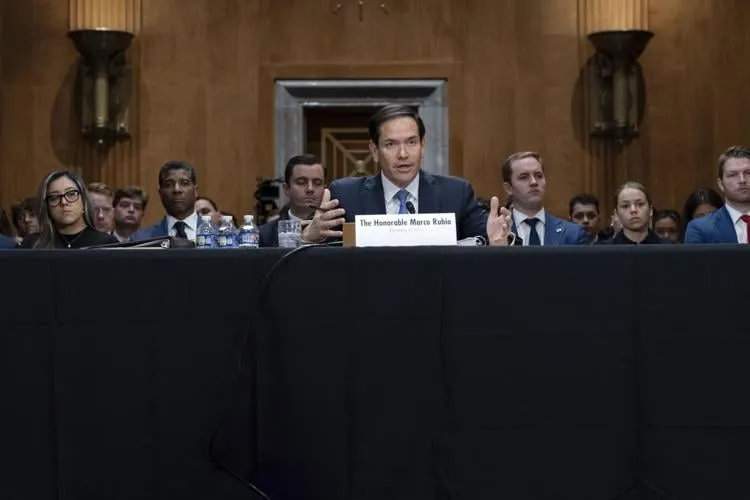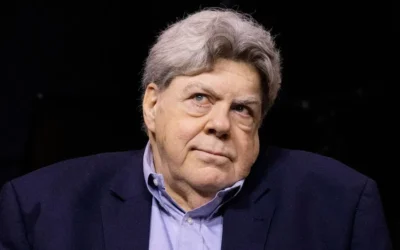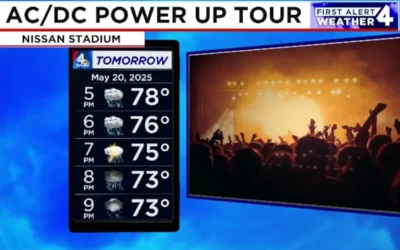Van Hollen and Rubio Square Off: The Battle Over Trump’s Foreign Policy Moves
In a recent Senate hearing, tensions escalated as key Senators debated the implications of former President Donald Trump’s foreign policy decisions and the proposed cuts to the State Department budget. This hearing brought together prominent political figures, including Senator Chris Van Hollen (D-MD) and Senator Marco Rubio (R-FL), who found themselves at the center of a contentious dialogue about the direction of America’s diplomatic engagements.
The Stakes of the Hearing
The hearing was held to discuss the State Department’s budget request, a topic that has garnered bipartisan interest but is often marred by political division. The backdrop to this discussion was starkly shaped by Trump’s controversial foreign policy, which some critics argue has undercut the United States’ standing on the global stage.
As Senator Van Hollen, a prominent critic of Trump’s policies, questioned Secretary of State Antony Blinken, his concerns were clear: the proposed budget cuts could have dire consequences for U.S. foreign relations and ultimately threaten national security. “We need to invest in diplomacy and development, not cut it. The future of our global leadership depends on it,” Van Hollen asserted during the hearing.
Rubio’s Defense of Cuts
Senator Rubio, in contrast, rose to defend the proposed budget cuts, arguing that many of the resources had not produced effective results and that the government must be more accountable in its spending. “Taxpayer dollars must be spent wisely. We have to prioritize our spending to focus on initiatives that truly enhance our national security,” he argued, echoing sentiments that have gained traction within a segment of the Republican Party.
Rubio emphasized the need for the State Department to adopt a more agile approach, one that revises long-standing diplomatic practices in favor of modern solutions that address present threats. His assertions, however, were met with skepticism, especially from Democrats, who fear that such cuts would dismantle crucial diplomatic services.
Live Coverage of the Senate Hearing
The hearing attracted significant live viewership as political enthusiasts followed the exchanges. The public witnessed a charged atmosphere, as questions and responses interjected a deeper discourse on the efficacy of previous administrations’ foreign policies. Key witnesses included Department officials, policy analysts, and other stakeholders who provided insights supporting both sides of the argument.
For viewers tuning in, the live discussion showcased not only partisanship but the broader implications of how budget allocations align with America’s values internationally. The public’s reaction on social media varied wildly, with hashtags trending that illustrated the division and engagement over the topic of America’s role in global diplomatic relations.
The Fallout of Former Policies
One of the core issues that arose during the hearing was the fallout of Trump’s policies—particularly his approach to key ally relations, international agreements, and multilateral organizations. Critics feel that Trump’s strategies have led to a more isolationist stance, jeopardizing long-standing partnerships and reducing the effectiveness of U.S. diplomacy.
Critics of the former President’s foreign policy often cite the withdrawal from the Paris Agreement and the Iran nuclear deal as pivotal moments where U.S. leadership faltered. These decisions were attributed to a lack of coordination and consultation with key allies, leading to an unpredictable global landscape.
Proponents of a New Approach
Congressional Democrats are broadly vocal against policies that echo isolationism and favor a return to a collaborative approach. Senator Van Hollen emphasized rebuilding relationships and working closely with international partners to counter shared threats such as climate change, terrorism, and economic instability.
The stark contrast between the visions shared by Democrats and Republicans reflects a deeper ideological divide within the American political landscape. While Rubio advocates for a more restrained fiscal policy regarding foreign aid and diplomacy, Van Hollen pushes for robust investment as a pivotal element of maintaining U.S. influence.
The Future of U.S. Foreign Policy
Looking ahead, these discussions in the Senate could shape the contours of American foreign policy in the coming years, particularly during a time of uncertainty in global relations. Analysts are watching closely to see how both parties will negotiate through budget allocations amid increasing pressure to adapt to new geopolitical realities.
The foreign policy debate not just involves budgeting but also ideological convictions about the U.S.’s role in the world. Democrats pushing for policies that enhance global cooperation face the challenge of opposing a Republican agenda that often leans toward retrenchment and skepticism in international engagements.
Conclusion
The hearing illustrated the significant disconnect between Republican and Democratic ideologies regarding foreign policy and budget strategy. As Van Hollen and Rubio continued to clash over the State Department’s future, the broader implications of their disagreements became evident: leadership, accountability, and investment in diplomacy are critical if the U.S. is to navigate the complexities of today’s international landscape successfully.
This Senate hearing serves as a microcosm of the ongoing debate that will undoubtedly play a pivotal role in defining the future of U.S. foreign policy in an increasingly interconnected and tumultuous world.







